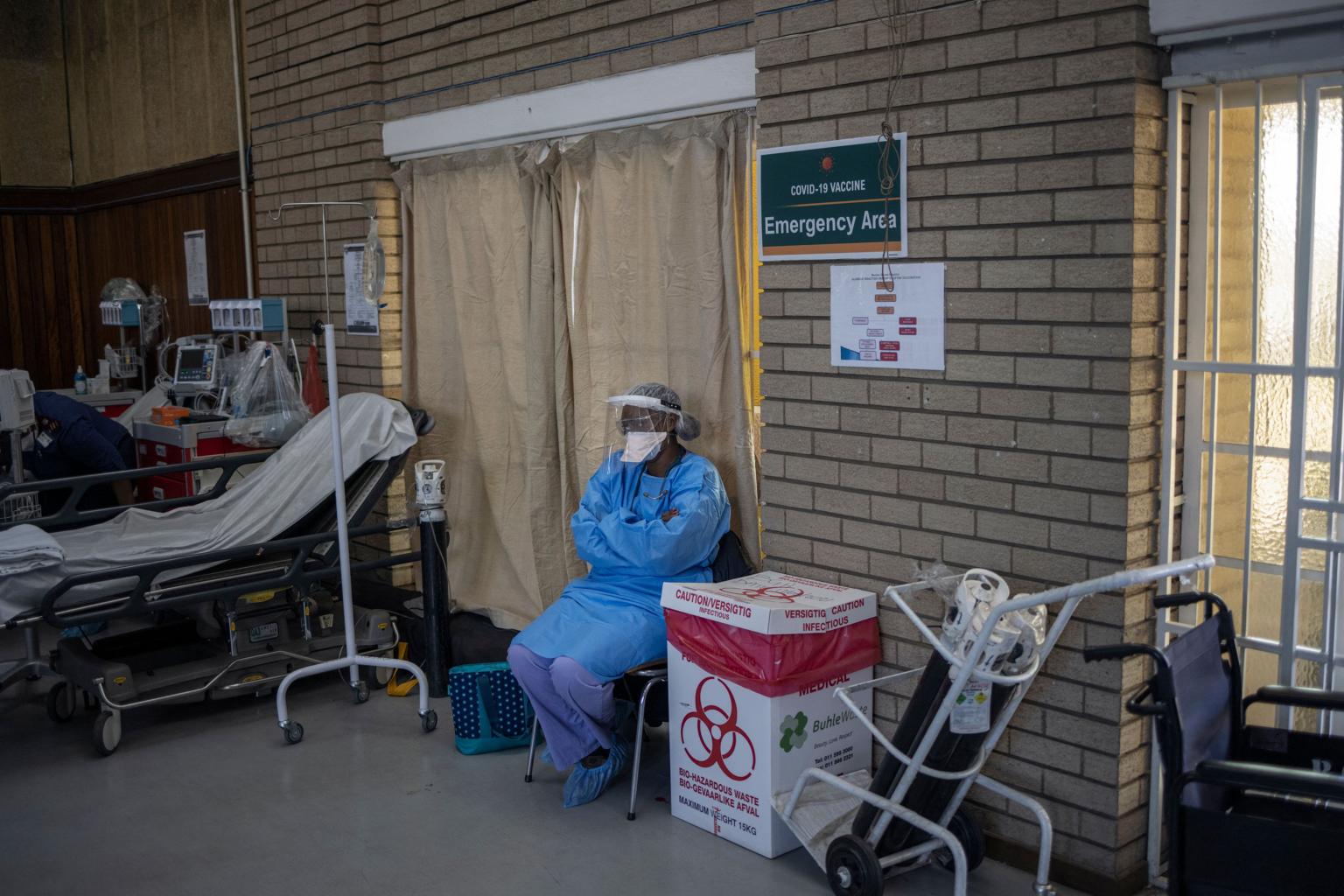Hospitals in South Africa industrial hub face being overrun by Covid-19 surge
Sign up now: Get ST's newsletters delivered to your inbox

Weekly hospital admissions are almost as high as they were during the height of the first wave in July.
PHOTO: AFP
Follow topic:
JOHANNESBURG (BLOOMBERG) - Hospital capacity in South Africa's industrial hub of Gauteng is at risk of being breached by surging Covid-19 cases within days.
The densely populated province, which includes Johannesburg and Pretoria, accounts for the bulk of the country's infections during the ongoing third wave, and health resources are already stretched.
Weekly hospital admissions are almost as high as they were during the height of the first wave in July last year, and the total number of cases is forecast to be twice as large as during the first two waves.
Yet at current staffing levels, only about 100 of about 1,000 extra beds that have been specially equipped for Covid-19 in Gauteng are able to be used, according to Dr Shabir Madhi, a professor of vaccinology at Johannesburg's University of the Witwatersrand.
"It seems the province forgot to budget or employ staff to manage those facilities," Dr Madhi said. "It needs to happen by this weekend or else we are going to be in deep trouble."
The situation has been exacerbated by the closure of one of the province's biggest hospitals. The Charlotte Maxeke facility in Johannesburg was shut down in April after a fire.
"There has been a terrible delay in reopening the hospital, which is completely unacceptable," Gauteng Premier David Makhura said in a presentation on Thursday (June 24). "Any more delays will cause severe health risks to the population of the province."
In the meantime, "we continue to expand human resources and bed capacity," he said.
South Africa President Cyril Ramaphosa this week acknowledged that more beds and medical workers are needed even after he deployed military personnel in the province on Monday to help healthcare workers conduct mass-screening and testing.
"They are opening up as many hospital beds as they possibly can," Mr Ramaphosa said on Tuesday at a media briefing. Complacency in measures such as wearing masks and avoiding large gatherings prompted the president to warn that further restrictions may be implemented.
"Gauteng already has a huge problem," said Dr Angelique Coetzee, chairman of the South African Medical Association. "As a doctor, just phone any hospital to say you have a Covid-19 patient that needs a bed and you won't find one. Even if government found another 2,000 beds, there are no personnel to staff them."
The country initially imposed strict lockdown measures, partly helping South Africa get through its first two waves of the coronavirus without major hospitals having to turn people away.
But a slow vaccination roll-out means only about 4 per cent of the national population has had any shots, just as the arrival of mid-winter leads more people to gather indoors. Mask wearing and restrictions on gatherings remain law but are rarely enforced.
The country's biggest private hospitals, Mediclinic International, Netcare and Life Healthcare Group Holdings, have joined calls for more vigilance and self-regulation in communities as both patient numbers and the severity of their conditions increase.
Still, Dr Madhi believes further lockdown measures would be too late.
"We are already close to a peak in the infection rate," he said. "We expect the peak in hospitalisations to come in three to four weeks."
Dr Coetzee also said she is seeing reinfections, and there is not enough evidence yet to show that a previous case of Covid-19 protects a patient against acute disease.
Yet the level of fatalities may prove to be lower. Medical staff know more about how to treat the disease, and equipment such as ventilators are being moved more quickly to areas under the most pressure.
Mr Richard Friedland, Netcare's chief executive, said his hospital has done everything possible to prepare for the increase in cases.
"We have substantially increased our Covid-19 bed capacity, contracted more resident medical officers and clinical associates and made every effort to ensure that we have adequate supplies of oxygen, the appropriate medication, as well as personal protective equipment to last us through this surge," he said.

